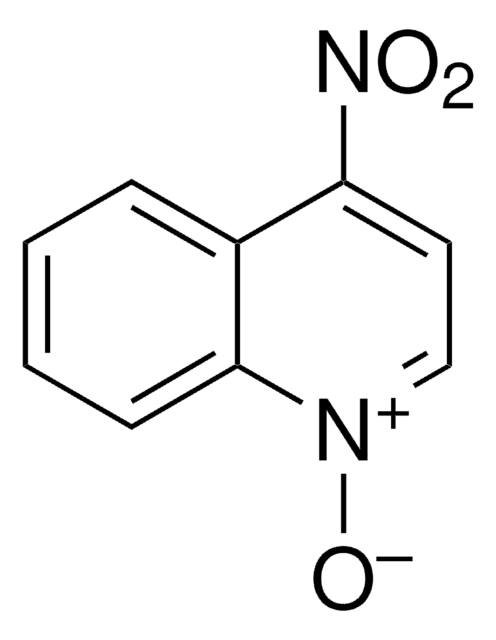N8509
N-Nitroso-N-ethylurea
Bulk package
Synonym(s):
ENU, N-Ethyl-N-nitrosourea
About This Item
Recommended Products
Quality Level
form
powder
contains
aqueous acetic acid as stabilizer
storage temp.
−20°C
SMILES string
CCN(N=O)C(N)=O
InChI
1S/C3H7N3O2/c1-2-6(5-8)3(4)7/h2H2,1H3,(H2,4,7)
InChI key
FUSGACRLAFQQRL-UHFFFAOYSA-N
Looking for similar products? Visit Product Comparison Guide
Application
- Genetic determinants of blood pressure and heart rate identified through ENU-induced mutagenesis with automated meiotic mapping.: This study identifies genetic factors affecting blood pressure and heart rate using N-ethyl-N-nitrosourea (ENU)-induced mutagenesis. The research utilizes automated meiotic mapping to reveal the genetic underpinnings of these cardiovascular traits, providing insights that could inform therapeutic targets (Teixeira et al., 2024).
- Clonality, trafficking, and molecular alterations among Hprt mutant T lymphocytes isolated from control mice versus mice treated with N-ethyl-N-nitrosourea.: This study examines the effects of ENU on T lymphocyte clonality and trafficking in mice. The findings provide insights into the mutagenic and immunological impacts of ENU, contributing to our understanding of chemical-induced mutations (Judice et al., 2023).
- Adopting duplex sequencing technology for genetic toxicity testing: A proof-of-concept mutagenesis experiment with N-ethyl-N-nitrosourea (ENU)-exposed rats.: This proof-of-concept study integrates duplex sequencing technology to test genetic toxicity in rats exposed to ENU. The results demonstrate the feasibility and effectiveness of this approach in detecting mutagenic effects, highlighting its potential for genetic toxicity assessment (Smith-Roe et al., 2023).
Biochem/physiol Actions
Packaging
Signal Word
Danger
Hazard Statements
Precautionary Statements
Hazard Classifications
Acute Tox. 3 Oral - Carc. 1B - Repr. 1B
Storage Class Code
6.1C - Combustible acute toxic Cat.3 / toxic compounds or compounds which causing chronic effects
WGK
WGK 3
Flash Point(F)
Not applicable
Flash Point(C)
Not applicable
Personal Protective Equipment
Certificates of Analysis (COA)
Search for Certificates of Analysis (COA) by entering the products Lot/Batch Number. Lot and Batch Numbers can be found on a product’s label following the words ‘Lot’ or ‘Batch’.
Already Own This Product?
Find documentation for the products that you have recently purchased in the Document Library.
Articles
DNA damage and repair mechanism is vital for maintaining DNA integrity. Damage to cellular DNA is involved in mutagenesis, the development of cancer among others.
Cancer research has revealed that the classical model of carcinogenesis, a three step process consisting of initiation, promotion, and progression, is not complete.
Our team of scientists has experience in all areas of research including Life Science, Material Science, Chemical Synthesis, Chromatography, Analytical and many others.
Contact Technical Service









